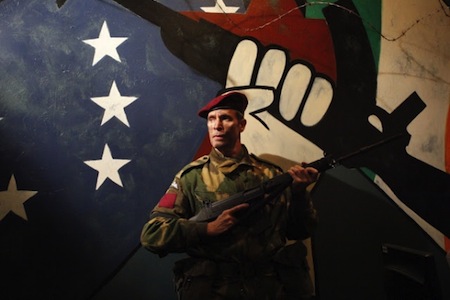The Irish Troubles Still Troubling Thirty Years Later

Credit: Irish Repertory Theater.
Freedom of the City
Irish Repertory Theater
132 W. 22nd Street
New York, N.Y.
In the summer of 1970, following the arrest of twenty-three-year-old Irish activist Bernadette Devlin, riots broke out in Derry, Northern Ireland, and caused an uproar throughout the world. They followed similar riots in 1969 and would be followed by more over the years as Irish demonstrators continually clashed with police. The worst was the Bloody Sunday massacre of 1972, in which thirteen protestors were shot dead by the police.
Right after Bloody Sunday, playwright Brian Friel wrote Freedom of the City. The play is loosely based on the 1970 riots. In his work, three protestors are killed and three more, by accident, wind up in the mayor's office in the Derry Guildhall, surrounded by the police.
The play has been revived at the Irish Repertory Theater as part of its twenty-fifth anniversary season and opened yesterday.
The play starts in menacing fashion. Theatergoers are greeted with a venue surrounded by barbed wire, a wall painting about the freeing of Derry and fierce armed British soldiers marching through the theater. Three dead bodies on stage are examined and then a magistrate takes the podium and explains what happened in the street demonstration that turned violent.
The three protestors in the Guildhall are an odd lot. Skinner is a young, cocky, and very angry man who insists that the plight of the poor and unemployed in Ireland is the cause of the riot. Michael is a smart, young guy who worries about how their accidental takeover of the building is going to turn out. Lily is a woman in her forties with eleven kids who lives in a two-room hovel.
The first act of the play is set up nicely, but moves too slowly. A troubadour appears from time to time to sing stories about the protests, a priest harangues his flock about them and a sociologist appears from a classroom somewhere to lecture the audience on how the crushing poverty of Northern Ireland and skyrocketing unemployment (14 percent) drove the people to demonstrate and how poverty is really the root cause of all political unhappiness.
The second act of the play is much better. Forced to decide what to do, the trio discusses the entire demonstration and their lives as protestors. Michael even plans a legal defense for the three as they get ready to give up. Here, actors James Russell (Michael), Cara Seymour (Lily) and Joseph Sikora (Skinner) do a fine job portraying brave but nervous demonstrators, caught in history’s vise.
The history in the play is rich and alluring. If you don’t know anything about “the Troubles,” which began in the late 1960s (though some of the Irish half-seriously maintain the Troubles began with the Norman invasion in the twelfth century) and only ended recently, you'll get a lot out of the play. If you do know something of Irish history, you'll get even more out of it, for while the IRA terror campaigns got the most ink, there was also a set of spontaneous demonstrations that drew as much from the American civil rights movement as Irish republicanism. The show’s program provides a condensed history of the “troubles” along with a timeline, right up to the end of them and the visit of Queen Elizabeth in 2011, the first official visit of a British monarch to Ireland in one hundred years. This is a treasure trove of Irish political history.
Director Ciaran O’Reilly does good work in staging a large play on a small stage. He worked wonders in giving his actors a sense of history. Civil wars and revolutions flood the world today and this one, even though thirty years old, tells the story of all of them.
O’Reilly gets good performances from Russell, Seymour and Sikora and from Ciaran Byrne as the priest, Christa Scott-Reed as the sociologist and John Vennema as the judge.
PRODUCTION: Produced by the Irish Repertory Theater. Sets: Charlie Corcoran, Costumes: David Toser, Lighting: Michael Gottlieb, Sound: M. Florian Staab. Dialect Coach: Stephen Gabis.
